人教新目标版九年级英语下专题复习课件 主谓一致
文档属性
| 名称 | 人教新目标版九年级英语下专题复习课件 主谓一致 | 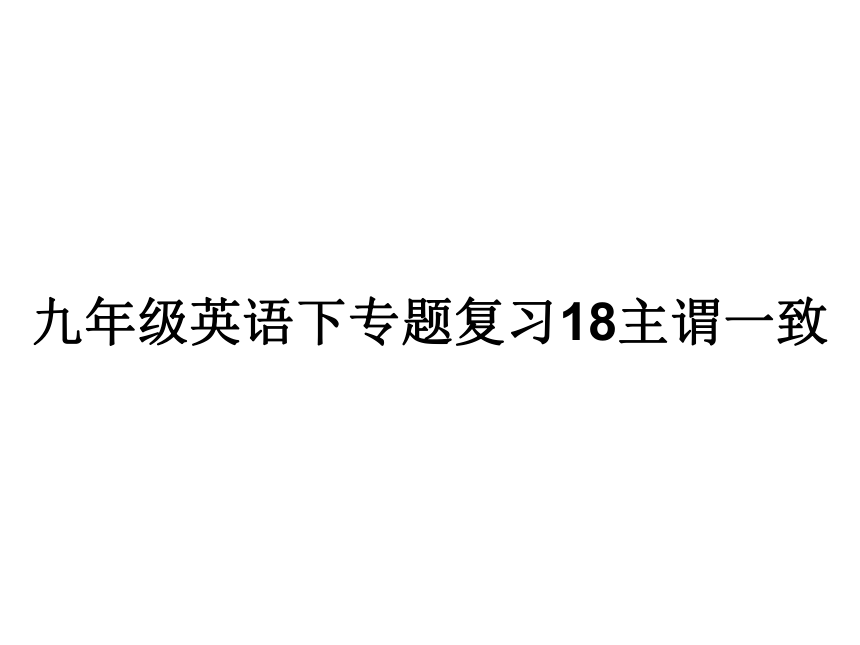 | |
| 格式 | zip | ||
| 文件大小 | 235.8KB | ||
| 资源类型 | 教案 | ||
| 版本资源 | 人教新目标(Go for it)版 | ||
| 科目 | 英语 | ||
| 更新时间 | 2017-05-20 16:41:13 | ||
图片预览

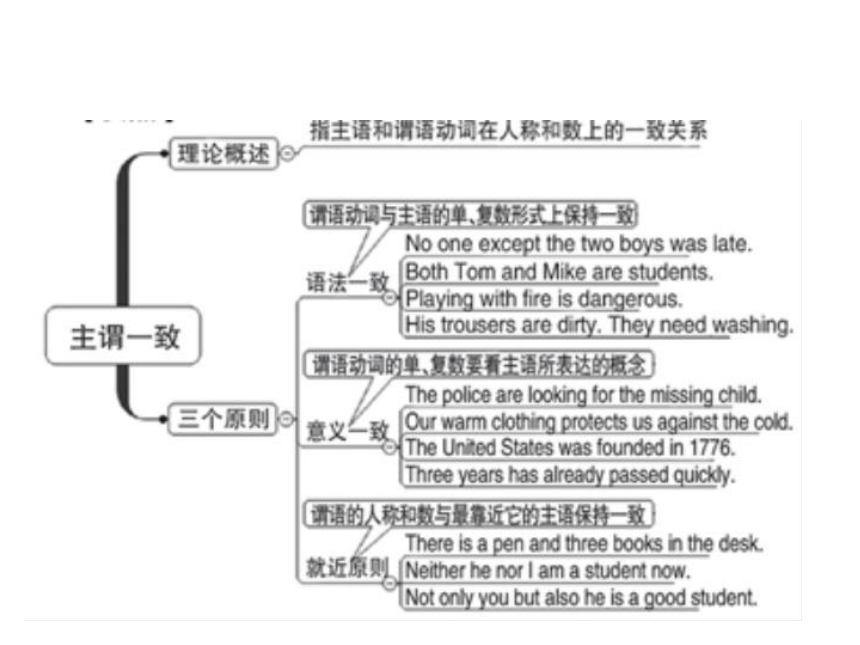
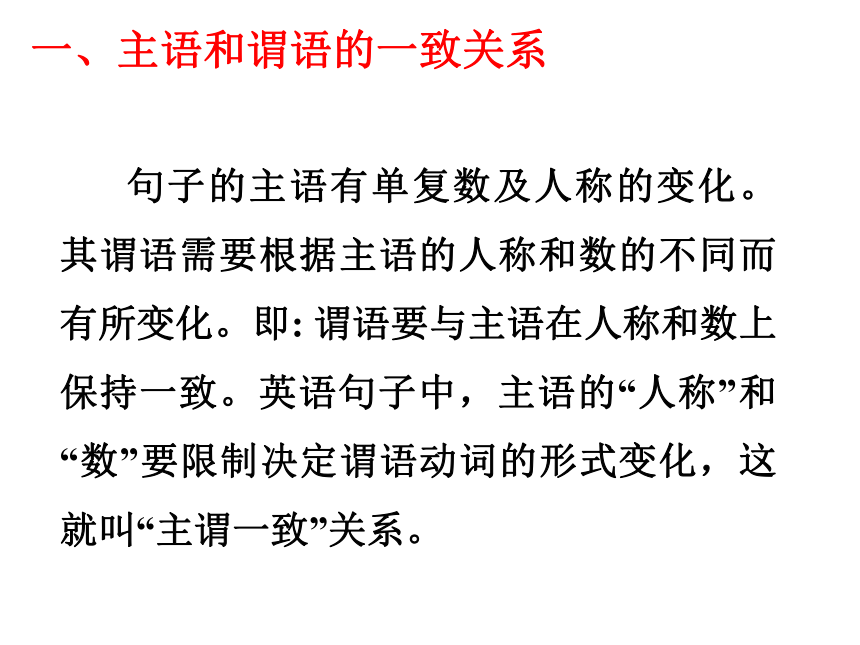
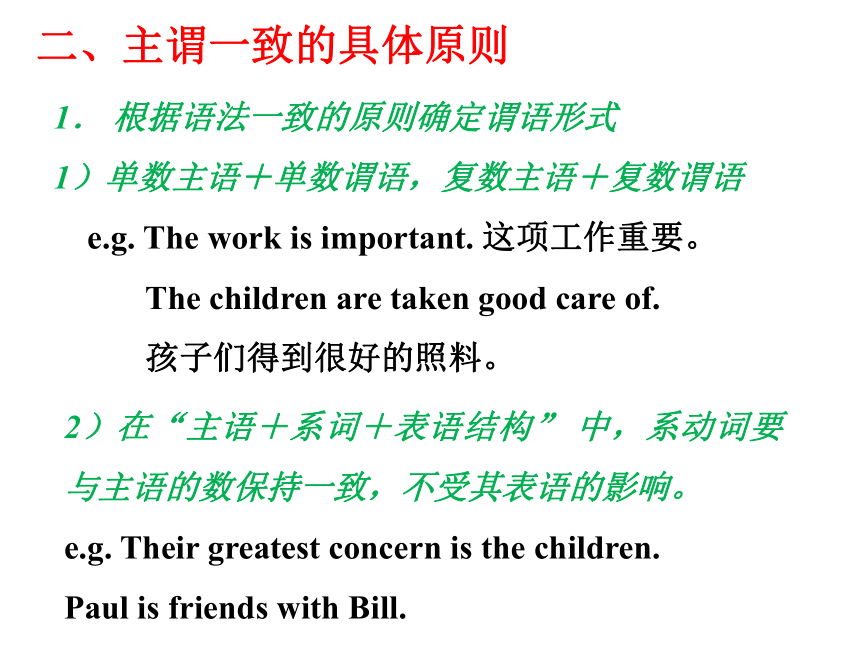
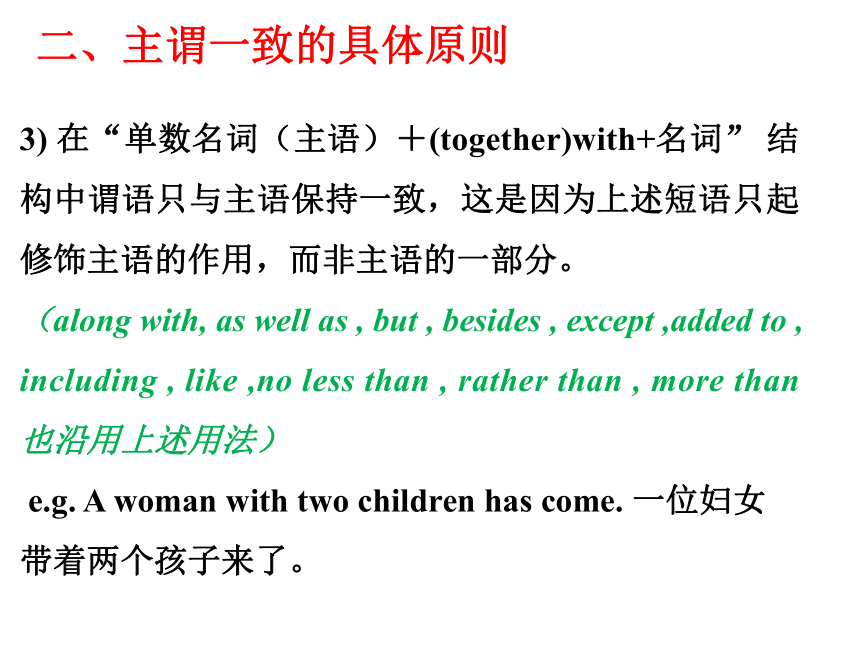
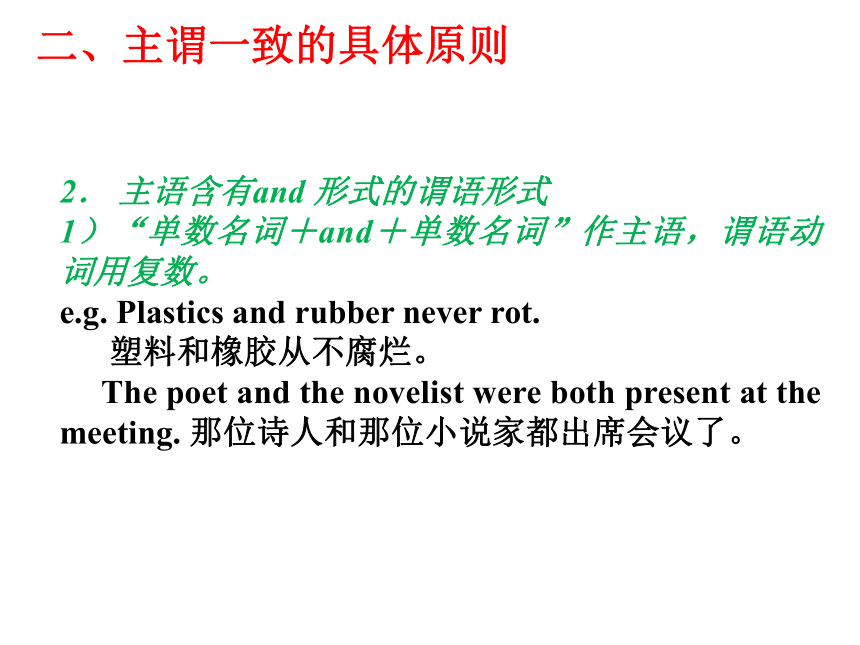

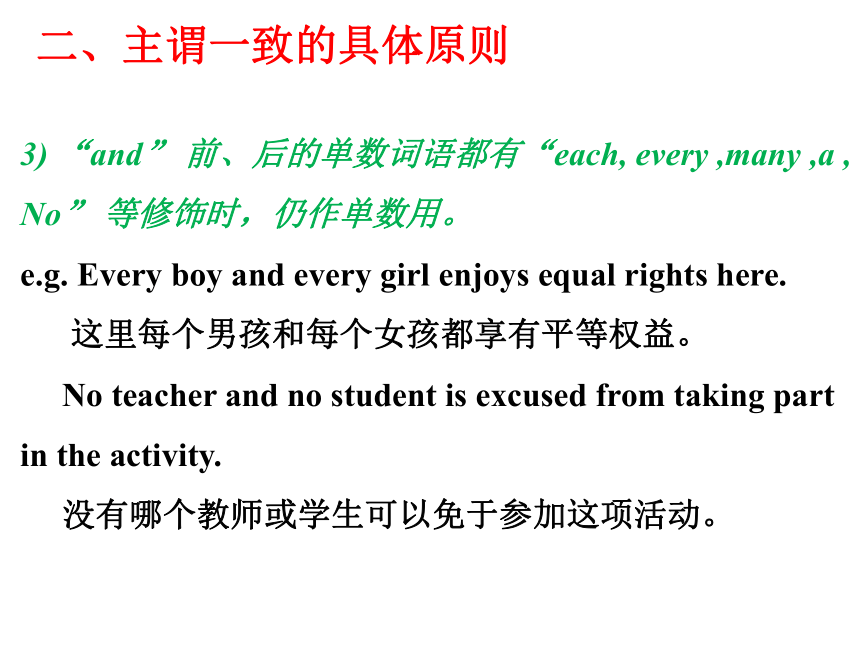

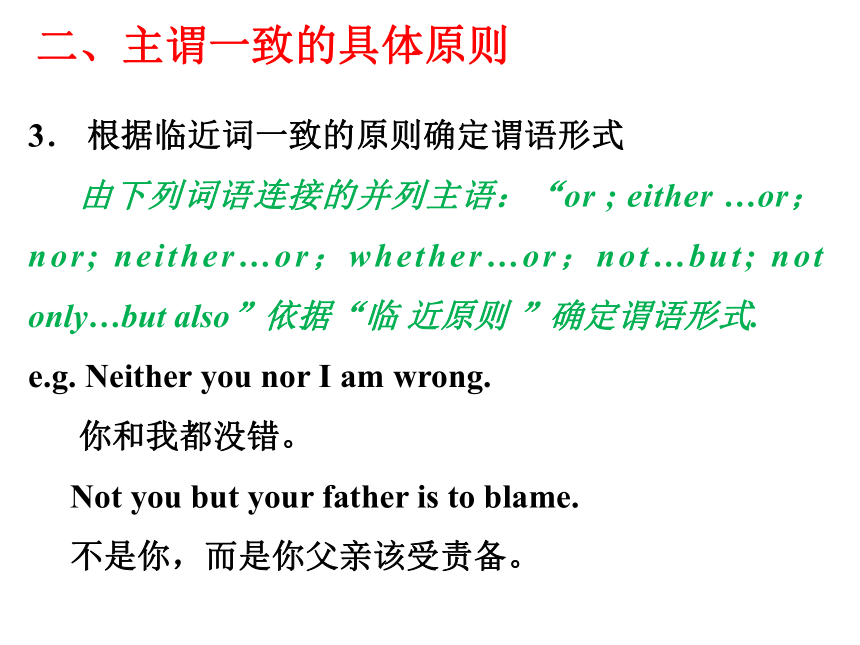
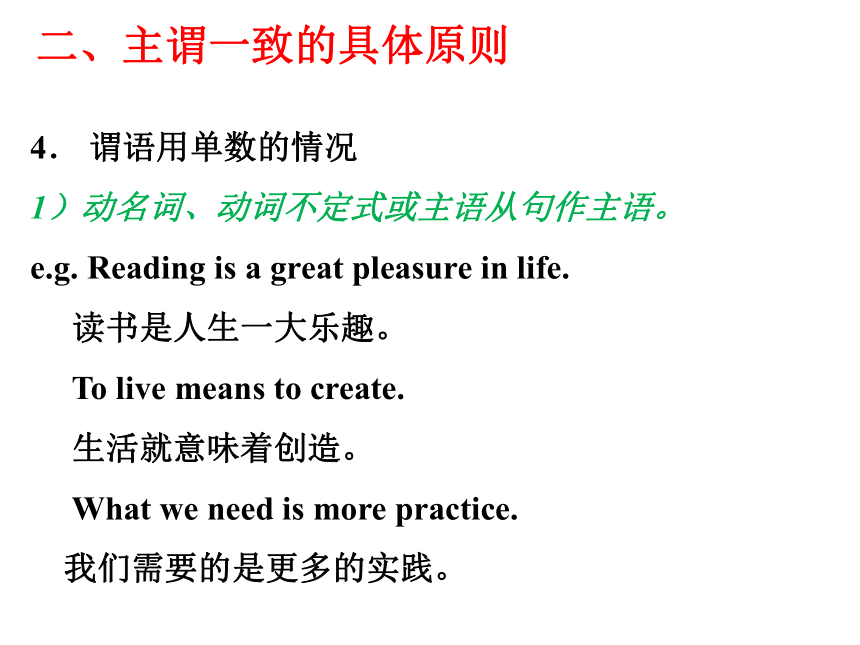
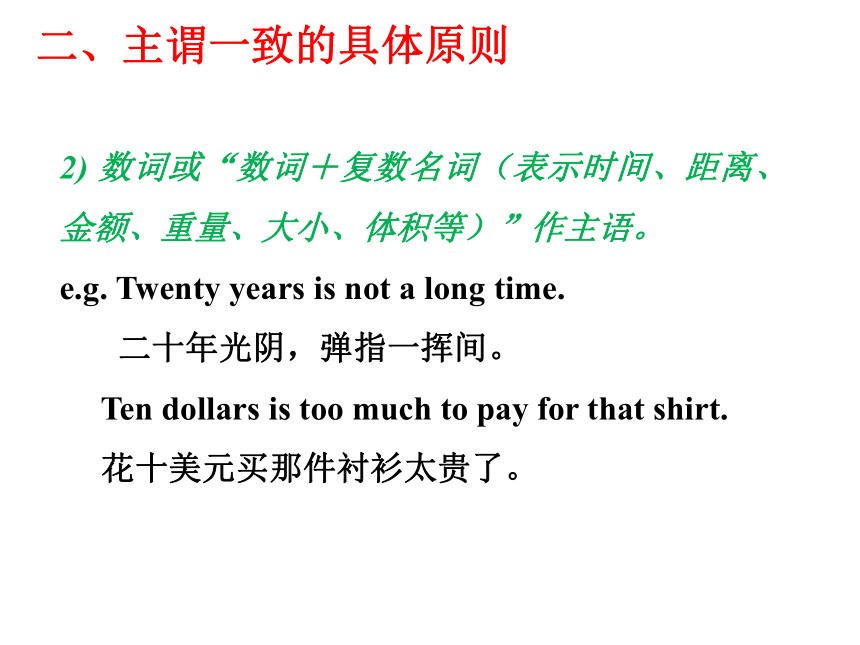
文档简介
课件40张PPT。九年级英语下专题复习18主谓一致 句子的主语有单复数及人称的变化。其谓语需要根据主语的人称和数的不同而有所变化。即: 谓语要与主语在人称和数上保持一致。英语句子中,主语的“人称”和“数”要限制决定谓语动词的形式变化,这就叫“主谓一致”关系。一、主语和谓语的一致关系1.?根据语法一致的原则确定谓语形式
1)单数主语+单数谓语,复数主语+复数谓语
e.g. The work is important. 这项工作重要。
??? The children are taken good care of.
孩子们得到很好的照料。2)在“主语+系词+表语结构” 中,系动词要与主语的数保持一致,不受其表语的影响。
e.g. Their greatest concern is the children.
Paul is friends with Bill.二、主谓一致的具体原则3) 在“单数名词(主语)+(together)with+名词” 结构中谓语只与主语保持一致,这是因为上述短语只起修饰主语的作用,而非主语的一部分。
(along with, as well as , but , besides , except ,added to , including , like ,no less than , rather than , more than 也沿用上述用法)
?e.g. A woman with two children has come. 一位妇女带着两个孩子来了。二、主谓一致的具体原则2.?主语含有and?形式的谓语形式
1)“单数名词+and+单数名词”作主语,谓语动词用复数。
e.g. Plastics and rubber never rot.
塑料和橡胶从不腐烂。
??? The poet and the novelist were both present at the meeting. 那位诗人和那位小说家都出席会议了。二、主谓一致的具体原则2) 如果并列主语指的是“同一个” 人(事、物、抽象概念),作单数用。
e.g. The worker and writer has come.
这位工人作家来了。 A cart and horse was seen in the distance.
远处能看见有一套马车。 Truth and honesty is the best policy.
真诚是最好的策略。二、主谓一致的具体原则3) “and” 前、后的单数词语都有“each, every ,many ,a ,
No” 等修饰时,仍作单数用。
e.g. Every boy and every girl enjoys equal rights here.
这里每个男孩和每个女孩都享有平等权益。 No teacher and no student is excused from taking part in the activity.
没有哪个教师或学生可以免于参加这项活动。二、主谓一致的具体原则4) 以“and”或“both… and”连接的并列主语通常作复数用 。
e.g. What he says and what he does do not agree.
他言行不一致。 Both Tom and I are fond of medicine.
我和汤姆都喜欢医学。二、主谓一致的具体原则3.?根据临近词一致的原则确定谓语形式
由下列词语连接的并列主语:“or ; either …or;nor; neither…or;whether…or;not…but; not only…but also”依据“临 近原则 ”确定谓语形式.
e.g. Neither you nor I am wrong.
你和我都没错。 Not you but your father is to blame.
不是你,而是你父亲该受责备。二、主谓一致的具体原则4.?谓语用单数的情况
1)动名词、动词不定式或主语从句作主语。
e.g. Reading is a great pleasure in life.
读书是人生一大乐趣。
To live means to create.
生活就意味着创造。
What we need is more practice.
我们需要的是更多的实践。二、主谓一致的具体原则2) 数词或“数词+复数名词(表示时间、距离、金额、重量、大小、体积等)”作主语。
e.g. Twenty years is not a long time.
二十年光阴,弹指一挥间。
??? Ten dollars is too much to pay for that shirt.
花十美元买那件衬衫太贵了。二、主谓一致的具体原则3)数形式的专有名词作主语。
“书名、剧名、报刊名、国家名”等通常作单数用。
e.g. The United States was founded in 1776.
美国成立于1776年。 The Arabian Nights is very interesting.
《天方夜谭》很有趣。二、主谓一致的具体原则4)“many+ a /more than one + 单名”大多接单数谓语。
e.g. Many a fine man has died for it.
许多优秀战士为此献出了生命。
??? More than one person was absent.
不止一个人缺席。二、主谓一致的具体原则5.?谓语用复数的情况
1)?集合名词作主语时有些通常作复数用(不变词形)。如:“people , police , cattle (牛,牲口),folk , youth , militia (民兵)”等。
e.g. The police have caught the murderer.
警方已捕获凶手。二、主谓一致的具体原则2) 有些指“整体” 时作单数,指其中的“成员” 时作复数(不变词形)。如 :
army, audience, class, club, company, committee, staff, family, public, government, group, party, union, couple, population, team等
e.g. The public are requested not to litter.
请公众不要乱扔废弃物。二、主谓一致的具体原则6?. 代词作主语时的谓语形式
1)不定代词“each ,one , much, (a)little ,either ,neither ,another ,the other(+单名)” 等常作单数用。它们所修饰的主语也作单数。
e.g. Each of the girls (Each girl) has a new hat.
每个女孩都有顶新帽子。 Neither of the plans suits / suit me.
两个计划都不适合我。二、主谓一致的具体原则2)下列复合不定代词一般作单数用: “someone ,somebody ,something ,anybody ,anyone ,anything ,everybody ,everyone ,everything ,nobody ,no one ,nothing ”等。
e.g. Is everybody here ?
都到齐了吗? There was nothing special then.
那时没什么特别情况。二、主谓一致的具体原则3)下列不定代词作复数用:
“(a)few ,many ,several, both”等。
e.g. Few (of the guests ) were familiar to us.
没几个(客人)是我们熟识的。 Both / Both (of ) these are interesting.
两部影片都有趣。二、主谓一致的具体原则4) 下列代词须视其“具体所指”来决定单、复数:“what ,which ,who ,whose ” 等。
e.g. Who is your brother ?
你兄弟是谁?
??? Who are League members ?
哪些是团员?二、主谓一致的具体原则5)“all , some ,more ,most ,any ,none ,a lot(of ), lots (of ),” 等。
e.g. All (of the students ) are working hard.
(所有的学生)都在用功。 All (of the paint ) is fine.
(这些油漆)都很好。
二、主谓一致的具体原则6)“half(of), plenty (of), the rest(of), (a)part(of), the remainder(of )余下的)” 等。
e.g. Half of the apples are bad.
苹果中有一半是坏的。
Half of the apple is bad.
这只苹果坏了一半。二、主谓一致的具体原则7.?谓语需经判断句子再决定的情况
单、复数同形或易混的词作主语时: 1) 以“-ics”结尾的学科名词:指教育、科研的某一学科,作单数。
e.g. Mathematics seems easy to me.
我似乎觉得数学不难。 但是,表“具体的学业、活动”等时,多用作复数。
e.g. Her mathematics are weak.
她数学差。(指“学业成绩、能力”)
What are your politics? 你的政治观点如何?二、主谓一致的具体原则2)“works工厂,means方法,series系列,species物种,aircraft飞机”等名词单、复数同形,要从上下文判断其具体意义来决定单、复数。
e.g. This works was(These works were)built two years ago. 这(几)家工厂是两年前修建的。 Every means has (All means have) been tried.
各种办法都试过了。
这类名词通常还有“fish ,deer ,sheep ,headquarters (总部驻地),bellows(风箱), plastics, gallows (绞架), manners(礼貌) ,whereabouts (行踪), ”等。(但news(消息)是不可数名词,通常只作单数用。) 二、主谓一致的具体原则3) “书刊名” 有时作单数或复数两可,尤其是编成集子的书。
e.g. Dickens’ American Notes were (was )
published in 1842.
狄更斯所著的《美国笔记》出版于1842年。 二、主谓一致的具体原则4) “what等引导的从句” 作主语时:大多作单数用。
e.g. What we need is more practice.
我们需要的是更多的实践。 What he says doesn’t agree with what he does.
他言行不一致。
若从句是含复数意义的并列结构、或“表语”是复数时,谓语动词用单数或复数两可。
e.g. What you say and think is /are no business of mine.
你怎么说以及怎么想,不关我的事。 What he bought was /were some books.
他所买的是几本书。二、主谓一致的具体原则5) “the + 形容词/分词 ” 作主语时: ?指“一类”人或事物时,常用作复数用。
e.g. The English speak English. 英国人讲英语。 The rejected were heaped in the corner.
废品堆在角落里。
指“某一个” 人,或“抽象的” 事物时,作单数用。
e.g. The deceased was his father.
去世的是他父亲。 The agreeable is not always the useful.
好看的不一定中用。 The new and progressive always wins over the old.
新生、进步的事物总是要战胜旧的东西。二、主谓一致的具体原则8?.表示数量的短语作主语时的谓语形式
1) 主语前加表示“单位、度量”的短语如“a kind (sort / type / form /pair /cup /glass /piece / load / block / box / handful / quantity / ton / metre /… )of”等时,表示“单位、度量”的这个名词的单复数决定谓语形式。
e.g. a)There is only a small quantity of paper left.
只剩下少量的纸了。 Large quantities of water are needed.
需要大量的水。二、主谓一致的具体原则b)This kind of apple is sweet.
这种苹果甜。
This kind of apples is (are) sweet.
(大多依 kind ,作单数用 )
These kind(s) of apple(s) are sweet.
(总作复数用) 但: Apples of this kind are sweet.
(总作复数用)二、主谓一致的具体原则2)“分数、百分数” 通常依其“具体所指” 来决定单、复数。
e.g. About 40 percent / two-fifths of the books here are (is) worth reading.
这些书中百分之四十/五分之二值得读。 Only sixty percent / three-fifths of the work was done yesterday.
昨天只干完了百分之六十/五分之三的工作。二、主谓一致的具体原则3)“a number of (许多)/ a variety of (各式各样) ”+复数名词,常作复数用。
e.g. A number of students in this class are (is)
from Sichuan. 这个班有不少同学来自四川。 There are a variety of toys in this shop.
这家商店有各种各样的玩具。二、主谓一致的具体原则 但是,“the number(数目)/ the variety(种类)” +of + 复数名词,作单数。
e.g. The number of students in this college has doubled.
这所大学的学生人数翻了一番。 The variety of goods in this shop is rich.
这家商店货物品种丰富。
?二、主谓一致的具体原则【品味中考】
1)单数主语+单数谓语,复数主语+复数谓语
e.g. The work is important. 这项工作重要。
??? The children are taken good care of.
孩子们得到很好的照料。2)在“主语+系词+表语结构” 中,系动词要与主语的数保持一致,不受其表语的影响。
e.g. Their greatest concern is the children.
Paul is friends with Bill.二、主谓一致的具体原则3) 在“单数名词(主语)+(together)with+名词” 结构中谓语只与主语保持一致,这是因为上述短语只起修饰主语的作用,而非主语的一部分。
(along with, as well as , but , besides , except ,added to , including , like ,no less than , rather than , more than 也沿用上述用法)
?e.g. A woman with two children has come. 一位妇女带着两个孩子来了。二、主谓一致的具体原则2.?主语含有and?形式的谓语形式
1)“单数名词+and+单数名词”作主语,谓语动词用复数。
e.g. Plastics and rubber never rot.
塑料和橡胶从不腐烂。
??? The poet and the novelist were both present at the meeting. 那位诗人和那位小说家都出席会议了。二、主谓一致的具体原则2) 如果并列主语指的是“同一个” 人(事、物、抽象概念),作单数用。
e.g. The worker and writer has come.
这位工人作家来了。 A cart and horse was seen in the distance.
远处能看见有一套马车。 Truth and honesty is the best policy.
真诚是最好的策略。二、主谓一致的具体原则3) “and” 前、后的单数词语都有“each, every ,many ,a ,
No” 等修饰时,仍作单数用。
e.g. Every boy and every girl enjoys equal rights here.
这里每个男孩和每个女孩都享有平等权益。 No teacher and no student is excused from taking part in the activity.
没有哪个教师或学生可以免于参加这项活动。二、主谓一致的具体原则4) 以“and”或“both… and”连接的并列主语通常作复数用 。
e.g. What he says and what he does do not agree.
他言行不一致。 Both Tom and I are fond of medicine.
我和汤姆都喜欢医学。二、主谓一致的具体原则3.?根据临近词一致的原则确定谓语形式
由下列词语连接的并列主语:“or ; either …or;nor; neither…or;whether…or;not…but; not only…but also”依据“临 近原则 ”确定谓语形式.
e.g. Neither you nor I am wrong.
你和我都没错。 Not you but your father is to blame.
不是你,而是你父亲该受责备。二、主谓一致的具体原则4.?谓语用单数的情况
1)动名词、动词不定式或主语从句作主语。
e.g. Reading is a great pleasure in life.
读书是人生一大乐趣。
To live means to create.
生活就意味着创造。
What we need is more practice.
我们需要的是更多的实践。二、主谓一致的具体原则2) 数词或“数词+复数名词(表示时间、距离、金额、重量、大小、体积等)”作主语。
e.g. Twenty years is not a long time.
二十年光阴,弹指一挥间。
??? Ten dollars is too much to pay for that shirt.
花十美元买那件衬衫太贵了。二、主谓一致的具体原则3)数形式的专有名词作主语。
“书名、剧名、报刊名、国家名”等通常作单数用。
e.g. The United States was founded in 1776.
美国成立于1776年。 The Arabian Nights is very interesting.
《天方夜谭》很有趣。二、主谓一致的具体原则4)“many+ a /more than one + 单名”大多接单数谓语。
e.g. Many a fine man has died for it.
许多优秀战士为此献出了生命。
??? More than one person was absent.
不止一个人缺席。二、主谓一致的具体原则5.?谓语用复数的情况
1)?集合名词作主语时有些通常作复数用(不变词形)。如:“people , police , cattle (牛,牲口),folk , youth , militia (民兵)”等。
e.g. The police have caught the murderer.
警方已捕获凶手。二、主谓一致的具体原则2) 有些指“整体” 时作单数,指其中的“成员” 时作复数(不变词形)。如 :
army, audience, class, club, company, committee, staff, family, public, government, group, party, union, couple, population, team等
e.g. The public are requested not to litter.
请公众不要乱扔废弃物。二、主谓一致的具体原则6?. 代词作主语时的谓语形式
1)不定代词“each ,one , much, (a)little ,either ,neither ,another ,the other(+单名)” 等常作单数用。它们所修饰的主语也作单数。
e.g. Each of the girls (Each girl) has a new hat.
每个女孩都有顶新帽子。 Neither of the plans suits / suit me.
两个计划都不适合我。二、主谓一致的具体原则2)下列复合不定代词一般作单数用: “someone ,somebody ,something ,anybody ,anyone ,anything ,everybody ,everyone ,everything ,nobody ,no one ,nothing ”等。
e.g. Is everybody here ?
都到齐了吗? There was nothing special then.
那时没什么特别情况。二、主谓一致的具体原则3)下列不定代词作复数用:
“(a)few ,many ,several, both”等。
e.g. Few (of the guests ) were familiar to us.
没几个(客人)是我们熟识的。 Both / Both (of ) these are interesting.
两部影片都有趣。二、主谓一致的具体原则4) 下列代词须视其“具体所指”来决定单、复数:“what ,which ,who ,whose ” 等。
e.g. Who is your brother ?
你兄弟是谁?
??? Who are League members ?
哪些是团员?二、主谓一致的具体原则5)“all , some ,more ,most ,any ,none ,a lot(of ), lots (of ),” 等。
e.g. All (of the students ) are working hard.
(所有的学生)都在用功。 All (of the paint ) is fine.
(这些油漆)都很好。
二、主谓一致的具体原则6)“half(of), plenty (of), the rest(of), (a)part(of), the remainder(of )余下的)” 等。
e.g. Half of the apples are bad.
苹果中有一半是坏的。
Half of the apple is bad.
这只苹果坏了一半。二、主谓一致的具体原则7.?谓语需经判断句子再决定的情况
单、复数同形或易混的词作主语时: 1) 以“-ics”结尾的学科名词:指教育、科研的某一学科,作单数。
e.g. Mathematics seems easy to me.
我似乎觉得数学不难。 但是,表“具体的学业、活动”等时,多用作复数。
e.g. Her mathematics are weak.
她数学差。(指“学业成绩、能力”)
What are your politics? 你的政治观点如何?二、主谓一致的具体原则2)“works工厂,means方法,series系列,species物种,aircraft飞机”等名词单、复数同形,要从上下文判断其具体意义来决定单、复数。
e.g. This works was(These works were)built two years ago. 这(几)家工厂是两年前修建的。 Every means has (All means have) been tried.
各种办法都试过了。
这类名词通常还有“fish ,deer ,sheep ,headquarters (总部驻地),bellows(风箱), plastics, gallows (绞架), manners(礼貌) ,whereabouts (行踪), ”等。(但news(消息)是不可数名词,通常只作单数用。) 二、主谓一致的具体原则3) “书刊名” 有时作单数或复数两可,尤其是编成集子的书。
e.g. Dickens’ American Notes were (was )
published in 1842.
狄更斯所著的《美国笔记》出版于1842年。 二、主谓一致的具体原则4) “what等引导的从句” 作主语时:大多作单数用。
e.g. What we need is more practice.
我们需要的是更多的实践。 What he says doesn’t agree with what he does.
他言行不一致。
若从句是含复数意义的并列结构、或“表语”是复数时,谓语动词用单数或复数两可。
e.g. What you say and think is /are no business of mine.
你怎么说以及怎么想,不关我的事。 What he bought was /were some books.
他所买的是几本书。二、主谓一致的具体原则5) “the + 形容词/分词 ” 作主语时: ?指“一类”人或事物时,常用作复数用。
e.g. The English speak English. 英国人讲英语。 The rejected were heaped in the corner.
废品堆在角落里。
指“某一个” 人,或“抽象的” 事物时,作单数用。
e.g. The deceased was his father.
去世的是他父亲。 The agreeable is not always the useful.
好看的不一定中用。 The new and progressive always wins over the old.
新生、进步的事物总是要战胜旧的东西。二、主谓一致的具体原则8?.表示数量的短语作主语时的谓语形式
1) 主语前加表示“单位、度量”的短语如“a kind (sort / type / form /pair /cup /glass /piece / load / block / box / handful / quantity / ton / metre /… )of”等时,表示“单位、度量”的这个名词的单复数决定谓语形式。
e.g. a)There is only a small quantity of paper left.
只剩下少量的纸了。 Large quantities of water are needed.
需要大量的水。二、主谓一致的具体原则b)This kind of apple is sweet.
这种苹果甜。
This kind of apples is (are) sweet.
(大多依 kind ,作单数用 )
These kind(s) of apple(s) are sweet.
(总作复数用) 但: Apples of this kind are sweet.
(总作复数用)二、主谓一致的具体原则2)“分数、百分数” 通常依其“具体所指” 来决定单、复数。
e.g. About 40 percent / two-fifths of the books here are (is) worth reading.
这些书中百分之四十/五分之二值得读。 Only sixty percent / three-fifths of the work was done yesterday.
昨天只干完了百分之六十/五分之三的工作。二、主谓一致的具体原则3)“a number of (许多)/ a variety of (各式各样) ”+复数名词,常作复数用。
e.g. A number of students in this class are (is)
from Sichuan. 这个班有不少同学来自四川。 There are a variety of toys in this shop.
这家商店有各种各样的玩具。二、主谓一致的具体原则 但是,“the number(数目)/ the variety(种类)” +of + 复数名词,作单数。
e.g. The number of students in this college has doubled.
这所大学的学生人数翻了一番。 The variety of goods in this shop is rich.
这家商店货物品种丰富。
?二、主谓一致的具体原则【品味中考】
同课章节目录
- 词法
- 名词
- 动词和动词短语
- 动词语态
- 动词时态
- 助动词和情态动词
- 非谓语动词
- 冠词
- 代词
- 数词和量词
- 形容词副词及其比较等级
- 介词和介词短语
- 连词和感叹词
- 构词法
- 相似、相近词比较
- 句法
- 陈述句
- 一般疑问句和否定疑问句
- 特殊疑问句及选择疑问句
- 反意疑问句
- 存在句(There be句型)
- 宾语从句
- 定语从句
- 状语从句
- 主谓一致问题
- 简单句
- 并列句
- 复合句
- 主谓一致
- 主、表语从句
- 名词性从句
- 直接引语和间接引语
- 虚拟语气
- 感叹句
- 强调句
- 倒装句
- 祈使句
- 句子的成分
- 句子的分类
- 题型专区
- 单项选择部分
- 易错题
- 完形填空
- 阅读理解
- 词汇练习
- 听说训练
- 句型转换
- 补全对话
- 短文改错
- 翻译
- 书面表达
- 任务型阅读
- 语法填空
- 其他资料
